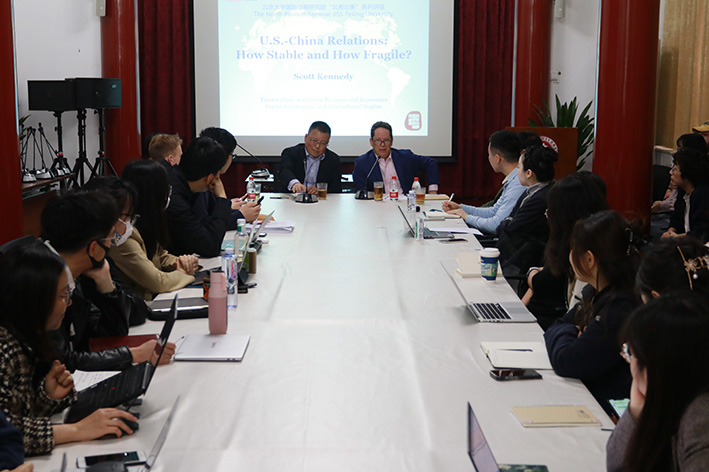On the afternoon of March 23, 2024, the Institute of International Strategic Studies (IISS), Peking University (PKU) held lecture series under the 72nd North Pavilion Seminar. Dr. Scott Kennedy, Senior Adviser and Director of the Project on Chinese Business and Economy at the Center for Strategic and International Studies (CSIS), delivered a lecture titled "China-U.S. Relations: Degrees of Stability and Fragility" and engaged in discussions with faculty and students present at the lecture. The lecture was chaired by Prof. Yu Tiejun, President of IISS, PKU. Prof. Wang Jisi, Founding President of the IISS, and Prof. Zhang Qingmin from the School of International Studies (SIS), PKU also attended the event.

According to Dr. Scott Kennedy, China-U.S. relations are intricate, featured by both resilience and fragility and the two countries present a state of "competition without conflict." The military deterrence capabilities of each country, their high economic interdependence, and deep dialogues and exchanges among various sectors of both societies play a major role in maintaining the stability of China-U.S. relations.
Dr. Scott Kennedy then highlighted that the outcome of the U.S. presidential election at the end of 2024 would have a significant impact on the direction of China-U.S. relations. He analyzed two potential scenarios, noting that if Trump was re-elected, U.S. foreign policy would likely adopt a more hawkish stance, potentially leading international actors to further enter a "self-help" state in the security domain. On the other hand, if Biden was re-elected, U.S. policies would exhibit strong continuity, with the Biden administration continuing to support the development of American manufacturing, strengthening relationships with allies, and pursuing a strategy of "de-risking" in relation to China. Additionally, the Biden administration would also show greater enthusiasm and ambition in areas such as digital economy governance and the construction of the international economic system.
Finally, Dr. Kennedy offered suggestions for actions China could take to improve China-U.S. relations. These include further reforms and opening up on China's part, strengthening communication and cooperation with the U.S. at the bilateral level, and more actively participating in the international rule-making in fields such as health, climate, and artificial intelligence at the global level.
During the Q&A session, Dr. Scott Kennedy engaged in an in-depth discussion and exchange with the faculty and students present at the lecture on topics such as regional economic integration, the "Belt and Road" initiative, ideological differences between China and the U.S., and the distinctions between "decoupling" and "de-risking." (Contributed by: Tong Ziyi)
Editor: Li Fangqi Photography: Zheng Peijie

